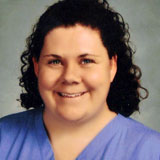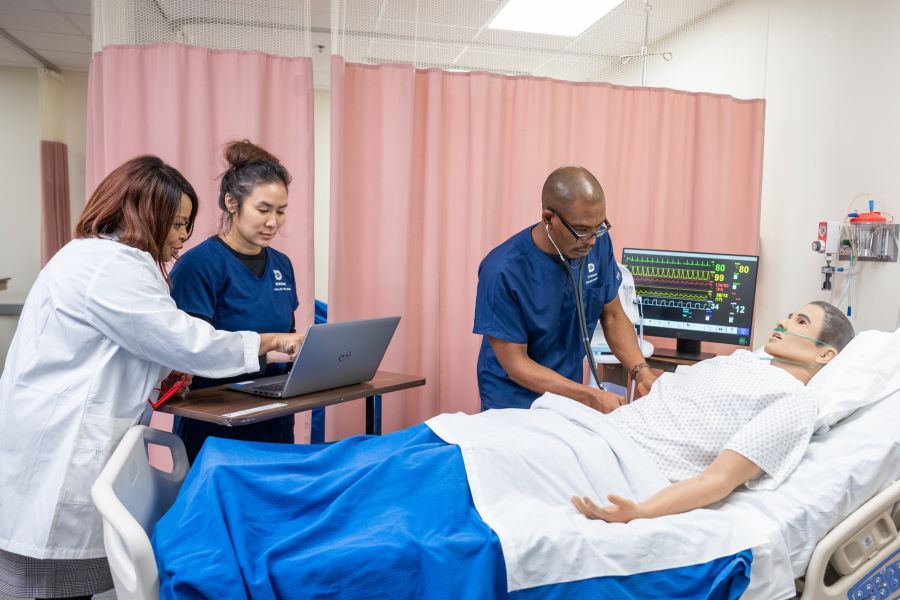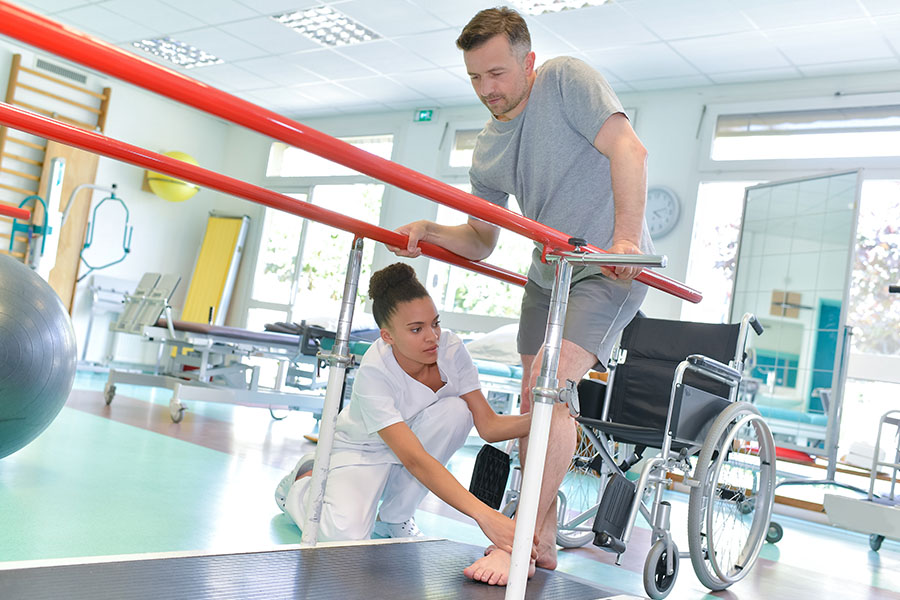Are you people-oriented, patient and willing to serve patients when they’re not at their best? Are you thorough, attentive to detail and able to manage time and stress? Would you like to work in a medical setting but aren’t sure how or where to start? Dallas College offers one of the few accredited Medical Assisting programs for college credit in North Texas.
With an increasing number of medical facilities, technological advancements and aging Americans who need medical treatment, the job market is thriving for those who enter this health field.
Medical Assisting at a Glance
1-2 years to complete1
$1,980-$11,520 tuition2
- El Centro3
What Can I Study?
I Want to Go to Work
Dallas College offers fast, flexible credentials designed with local employers to help you quickly start or advance your career.
-
Workforce Certificates
- CEU Medical Assisting Certificate $10,800 1 year
- CEU Medical Assisting Certificate $11,520 1 year
- Medical Assisting $5,040 6 months
-
Credit Certificates
- Medical Assisting Certificate $3,960 1 year
- Medical Assisting Generalist Certificate $1,980 8 months
Length of time is based on catalog degree plans1. Tuition rates are based on program hours for Dallas County residents2.
Can I Get a Job?
Dallas College offers a variety of certificates and degrees to help you gain the skills you need to start working right away.
- These credentials are often considered Career and Technical Education (CTE).
- These credentials are established with the assistance and cooperation of representatives from local business, to meet local and regional employment needs.
- Higher level certificates and degrees will typically lead to a higher salary in the workforce.
- Workforce (CE) Certificates can often be completed faster than traditional credit certificates but typically do not offer college credit.
- Level 1, Level 2, Enhanced Skills certificates and others, offer college credit and are often stackable to help you build skills as you work towards an Associate Degree.
- Workforce credentials may give you college credit at Dallas College, but they may not transfer to other colleges or universities.
If you're unsure if this is the right path for you, you can talk to a Pathway Specialist for advice.
Pathway Specialist
- 972-669-6400
- AskSOHS@DallasCollege.edu
What Can I Earn? Will There Be Plenty of Jobs?
Join one of the fastest-growing U.S. job fields! As a medical assistant, you’ll work with patients, helping with a wide variety of health care and office tasks. Check out a few of the incredible career opportunities you’ll be ready for. Your future starts here!

Health Information Technologists and Medical Registrars
$36/hr
Median Salary
80
Job Openings
+27%
Projected Outlook

Medical Assistants
$19/hr
Median Salary
3610
Job Openings
+22%
Projected Outlook
Top Skills:
- Social Perceptiveness
- Speaking
- Active Listening
- Reading Comprehension
- Critical Thinking
- Monitoring
- Service Orientation
- Coordination
- Writing
- Active Learning

Medical Secretaries
$19/hr
Median Salary
2761
Job Openings
+13%
Projected Outlook
Top Skills:
- Speaking
- Active Listening
- Service Orientation
- Reading Comprehension
- Writing
- Critical Thinking
- Time Management
- Complex Problem Solving
- Coordination
- Social Perceptiveness

Medical Transcriptionists
$14/hr
Median Salary
251
Job Openings
+5%
Projected Outlook
Top Skills:
- Active Listening
- Reading Comprehension
- Writing
- Monitoring
- Critical Thinking
- Speaking
- Time Management
- Judgment and Decision Making
- Active Learning
- Social Perceptiveness
All jobs data gathered for Dallas/Fort Worth. Source: Dallas College Labor Market Intelligence and Lightcast4.
“I would recommend this program in a New York minute. Medical assisting is a great occupation, whether you're looking to become proficient in this field or use it as a stepping stone to move on to other health care specialties.” Read Melanie Lofgren's story.

A Look Inside Medical Assisting
Are you looking for a people oriented career in the field of health care but not sure where to start? If so, the Medical Assisting Certificate Program may be the perfect fit. As a Medical Assistant, you act as a liaison between physicians and patients. You will complete vital sign assessments with patients, complete laboratory and EKG testing, and assist with appointments as needed.
So why choose Dallas College to jumpstart your career? As a student, you'll have access to teaching labs that simulate surgical and hospital settings. You'll learn from seasoned faculty who care about student success. Want to know more? Visit our website and begin your Dallas College experience.
Because this profession is very people-centered, Medical Assisting courses are not offered online. After completing the didactic courses in the program and learning all of their skills, medical assistant students perform a 160-hour internship at a local physician’s office or clinic. Some students use the Medical Assisting program as a stepping stone to becoming a Licensed Vocational Nurse, by means of our Licensed Vocational Nurse pathway.
Classes for the program are held at the Downtown Health Sciences Center (formerly El Centro’s Center for Allied Health and Nursing) at Market and Pacific streets, one block northwest of the El Centro campus. Opened to house our allied health programs, the center comprises 55 classrooms and labs that contain some of the most advanced equipment available to educate health care students.
The center’s high-tech equipment includes:
- Teaching labs that simulate surgical and hospital settings for specific program applications.
- Microphones and cameras in each classroom to capture audio and video instruction.
- Three classrooms with videoconferencing for two-way viewing.
- Two simulation labs with computerized patient mannequins.
Transferring
The Medical Assisting program is designed for direct entry into the workforce. However, if you are interested in earning a degree at a four-year institution, please visit the Transfer Services website for guidance on the transfer process.
Dallas College has an articulation (transfer) agreement with Dallas Baptist University to apply the entire Medical Assisting program toward a bachelor’s degree in Health Services Management. An articulation agreement is also in place with the University of North Texas.
The Medical Assisting program has its own admissions process, timeline and requirements. Visit the School of Health Sciences Information Packets and Sessions page to view the Medical Assisting information packets.
Please email the Health Occupations Admissions Office or call 972-669-6400, press 1 for Admissions, followed by 2 for Nursing and Allied Health Admissions, to receive an information packet and information session details.
This program also requires a criminal background check and drug testing.
Accreditation and Affiliations
The Medical Assisting program is accredited by the Commission on Accreditation of Allied Health Education Programs (CAAHEP), upon the recommendation of the Medical Assisting Education Review Board (MAERB).
CAAHEP
9355 113th St. N, Unit 7709
Seminole, FL 33775
The goal of the Medical Assisting program is to prepare medical assistants who are competent in the cognitive (knowledge), psychomotor (skills), and affective (behavior) learning domains to enter the profession.
Medical Assisting 5 Year Outcomes
| Year | Retention |
|---|---|
| 2024 | 74.29% |
| 2023 | 75.00% |
| 2022 | 82.98% |
| 2021 | 85.00% |
| 2020 | 75.56% |
| Five Year Average | 78.97% |
The Medical Assisting program at Dallas College has a five-year retention rate of 78.97% for the years 2020 – 2024.
Links to Additional Information
Note: Links to the following websites are provided for your convenience and information and do not constitute official endorsement by us.
- American Medical Technologists is a nonprofit certification agency and professional membership association representing more than 46,000 individuals in allied health care.
- The Commission on Accreditation of Allied Health Education Program is the largest program accreditor in the health sciences field. In collaboration with its Committees on Accreditation, CAAHEP reviews and accredits more than 2,000 educational programs in 22 health science occupations.
Prior Learning
Dallas College’s Prior Learning Assessment helps you earn college credit for knowledge you’ve gained on the job. If you have work experience, you can earn your associate degree faster by using your professional skills to get closer to graduation.
Find Out More About Medical Assisting
Sign up to receive additional information about Medical Assisting or call 972-669-6400.
School of Health Sciences
- 972-669-6400
- AskSOHS@DallasCollege.edu
Dallas College
- 972-669-6400
- Text College to 214-978-6457
- StudentHelp@DallasCollege.edu
1Length of time is based on catalog degree plans. Prerequisites may be required, which are not included in this estimate. For most programs, full-time student status is assumed, a minimum of 12 credit hours per semester.
2Cost is based on tuition rates for program hours for Dallas County residents. The price of most required learning materials (books, software, supplies, etc.) is included with the price of tuition. Certain programs may have additional costs above the standard tuition. Please review the Area of Study Overview and/or the Health Information Packets for additional costs and details. Visit our Paying for College site to learn more about cost, financial aid, scholarships and more.
3Each location offers a unique combination of certificate and degree options. Not all degree and certificate offerings are available for admission/start at all campuses every semester.
4A portion of Lightcast’s data comes from O*NET Online by the U.S. Department of Labor, Employment and Training Administration (USDOL/ETA). Used under the CC BY 4.0 license. O*NET® is a trademark of USDOL/ETA. Lightcast has modified all or some of this information. USDOL/ETA has not approved, endorsed, or tested these modifications.
HB1508 Notice
This program may lead to an occupational license for which a prior criminal history may make a student ineligible.
For more information, please visit DallasCollege.edu/hb1508.




-900x600.jpg)
